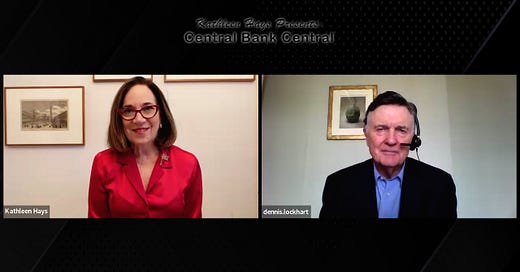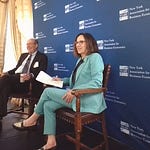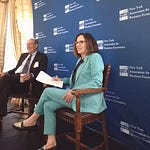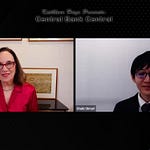Dennis Lockhart was president of the Federal Reserve Bank of Atlanta from 2007 to 2017, during the turbulent decade of the Great Financial Crisis when Ben Bernanke ushered in unconventional monetary policy tools like zero interest rates and quantitative easing and ended as Janet Yellen continued steps to normalize policy after an extended period of low rates in the wake of the Great Recession.
Now after his ten years of trial by fire at the Fed, Dennis continues to see its monetary policy path through a clear, centrist lens. And what he sees now as Chair Powell and the rest of the FOMC get ready to make what is expected to do another 25bps rate cut at its meeting this week, he is on board with the taking another step down their “recalibration” path.
”I think the basic logic is they set the rate of 5-1/4 to 5-1/2 in a period in which inflation was very elevated, much more elevated than it is today. That essentially amounted to significant restriction on the economy in order to get the inflation rate moving in the right direction. They've seen substantial progress They've seen substantial progress and they're very confident that it will continue. And it is simply time to remove restrictiveness.
”I think they can do that probably fairly substantially without actually risking the momentum of the economy and risking much damage to the employment picture. So I think they're simply shifting from a policy setting that was designed for a different set of circumstances to a policy setting that is appropriate for where the economy is today and where it appears to be going.
“That has been called recalibration. I think that's a good way to think about it. It's not corrective. It is really simply to get the setting of policy align with the economy.”
Dennis thinks the big question now is what the Fed does at its meetings in December and January meetings. Depending on data coming in the next several weeks, he expect the Fed to do another 1/4 point rate cut at the final meeting of the year.
Given that Fed Board Governor Michelle Bowman disssented against the FOMC’s 50bps cut at the September meeting, he says it’s possible that there could is a “constituency” on the FOMC that would vote to “skip” a rate cut in December and wait to assess the need for another cut in January.
Dennis is betting that if the Fed does two more 25 bps cuts by year’s end, hitting the 100bps of moves many have forecast, that the Fed will vote for a “pause” in January’ is order to assess the impact of rate cuts and see what more may - or may not - need to be done.
On this U.S. election day, we also took a look at some of the big issues hanging over where Fed policy goes next year. Dennis shares his concerns about fiscal policy that is expected to be highly expansionary, no matter who wins the White House, and could roil bond markets.
So dive in and hear, see what Dennis has to say. When you listen to Chair Powell’s post-meeting presser on Thursday, you will be that much better prepared to digest the signals he may sending for where policy goes now and next year.
Dennis P. Lockhart became the fourteenth president and chief executive officer of the Federal Reserve Bank of Atlanta on March 1, 2007. He retired on February 28, 2017.
Lockhart was born in Bakersfield, California. He attended Stanford University and earned a bachelor’s degree in political science and economics in 1968. In 1971, he earned a master’s degree in international economics and American foreign policy from the Johns Hopkins University School of Advanced International Studies. He also attended the Senior Executive Program at MIT’s Sloan School of Management in 1994. He served as an officer in the US Marine Corps Reserve from 1968 to 1974.
Lockhart started his career with Citicorp/Citibank (now Citigroup). From 1971 to 1978, he held various international positions in Saudi Arabia, Greece, and Iran. From 1978 to 1986, he was senior corporate officer of the Southeast office of Citibank in Atlanta. From 1987 to 1988, Lockhart was head of the firm's Latin American debt-to-equity swap investment program, designed to restructure sovereign debt.
From 1988 to 2001, Lockhart worked at Heller Financial, where he served as president of Heller International Group, which had activities in commercial banking, finance and merchant banking in North and South America, Europe and Asia. From 2001 to 2003, he was managing partner at Zephyr Management LP, a private equity firm based in New York with activity in Africa and Latin America.From 2003 to 2007, Lockhart served on the faculty of Georgetown University's Walsh School of Foreign Service, teaching in the master's program. In this role, he was chairman of the program's concentrations in international business-government relations and global commerce and finance. He also was an adjunct professor at Johns Hopkins University's Nitze School of Advanced International Studies.
Before joining the Atlanta Fed, Lockhart served as a member of the boards of directors of several companies, including CapitalSource Inc., Tri-Valley Corp., and Greenfield Holdings Credit Ltd. He was also chairman of the Small Enterprise Assistance Funds. He served on the Advisory Committee of the US Export-Import Bank and chaired the committee in 2000.
During Lockhart’s tenure, the Federal Reserve faced some of the most traumatic economic events since the Great Depression of the 1930s, including the financial crisis and Great Recession. Lockhart has given many speeches on the financial crisis, monetary policy, and the economy.
1













Share this post